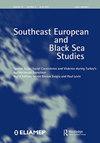Turkey in between the EU and China: from Europeanization to cooperation with China
IF 0.8
2区 社会学
Q2 AREA STUDIES
引用次数: 0
Abstract
ABSTRACTTurkey has been on the path of EU membership since the 2000s, and the democratization process was well underway during the initial years of its candidacy. However, this trend was reversed substantially, with Turkey growing increasingly authoritarian during the 2010s. This substantial democratic backsliding has led to increasing authoritarian cooperation with the authoritarian powers on the rise, one of which is China, whose increasing engagement and cooperation with Turkey marked an alternative gravity centre for Turkey to be pulled by. This article argues that Turkey, in line with the worsening domestic authoritarianism, has been engaging with the authoritarian powers for survival rather than engaging with the EU, which provided legitimacy to the rule of the AKP during the initial years of its rule.KEYWORDS: Authoritarian cooperationChinaEuropean UnionEuropeanizationTurkey Disclosure statementNo potential conflict of interest was reported by the author(s).Notes1. Turkey was the voice of Uyghurs on international platforms until 2015 as the home of the largest Uyghur diaspora outside Central Asia. However, increasing economic and political cooperation between Turkey and China led to Turkey remaining silent regarding China’s persecution of the Uyghurs, despite the Uyghurs being a Turkic Muslim community (Öniş and Yalikun Citation2021, 522). Additionally, during Erdoğan’s visit to China in 2017, Turkey and China signed an extradition treaty to restrict cross-border criminal activities. Although it has not been ratified by the Turkish parliament, there are some cases indicating that Turkey has already applied rendition, detention, and surveillance to its Uyghur population (Radio Free Asia Citation2019). Hence, Turkey’s turning into an authoritarian regime not only facilitated its cooperation with China but also caused Turkey to abandon the Uyghurs.Additional informationNotes on contributorsGözde YilmazGözde Yilmaz is a Jean Monnet Fellow at the European University Institute and professor in Atılım University. Her research interests are norm and authoritarian diffusion, external Europeanization, EU-Turkey-China relations, minority rights and non-discrimination in the EU and Turkey and Westerm Balkans.Nilgün Eliküçük YıldırımNilgün Eliküçük Yıldırım is an associate professor in the department of international relations at Atılım University in Ankara. Her research interests include Chinese foreign policy, Turkey-China Relations, IPE, social psychology.欧盟与中国之间的土耳其:从欧洲化到对华合作
摘要自2000年代以来,土耳其一直走在加入欧盟的道路上,在其候选资格的最初几年,民主化进程正在顺利进行。然而,这一趋势被大幅逆转,土耳其在2010年代变得越来越独裁。这种实质性的民主倒退导致土耳其与正在崛起的威权国家之间的威权合作日益增多,其中之一就是中国,中国与土耳其日益增多的接触与合作标志着土耳其可以被拉动的另一个重心。本文认为,与日益恶化的国内威权主义一致,土耳其一直在与威权主义势力打交道,而不是与欧盟打交道,后者在正义与发展党执政的最初几年为其统治提供了合法性。关键词:威权合作中国欧盟欧化土耳其披露声明作者未报告潜在利益冲突。直到2015年,土耳其一直是维吾尔人在国际平台上的代言人,是中亚以外最大的维吾尔人聚居地。然而,土耳其和中国之间日益增长的经济和政治合作导致土耳其对中国对维吾尔人的迫害保持沉默,尽管维吾尔人是突厥穆斯林社区(Öniş和Yalikun Citation2021, 522)。此外,在Erdoğan 2017年访问中国期间,土耳其和中国签署了一项引渡条约,以限制跨境犯罪活动。因此,土耳其变成专制政权不仅促进了与中国的合作,而且导致土耳其放弃维吾尔人。Yilmaz是欧洲大学研究所Jean Monnet研究员,也是Atılım大学的教授。她的研究兴趣为规范与威权扩散、外部欧洲化、欧盟-土耳其-中国关系、欧盟、土耳其和西巴尔干地区的少数民族权利与非歧视。nilgn elik k YıldırımNilgün,安卡拉Atılım大学国际关系系副教授。主要研究方向为中国外交政策、土耳其与中国关系、国际政治经济学、社会心理学。
本文章由计算机程序翻译,如有差异,请以英文原文为准。
求助全文
约1分钟内获得全文
求助全文
来源期刊

Southeast European and Black Sea Studies
AREA STUDIES-
CiteScore
3.00
自引率
19.00%
发文量
73
期刊介绍:
The aim of the journal is to establish a line of communication with these regions of Europe. Previously isolated from the European mainstream, the Balkan and Black Sea regions are in need of serious comparative study as are the individual countries, no longer "at the edge" of Europe. The principal disciplines covered by the journal are politics, political economy, international relations and modern history; other disciplinary approaches are accepted as appropriate. The journal will take both an academic and also a more practical policy-oriented approach and hopes to compensate for the serious information deficit on the countries under consideration.
 求助内容:
求助内容: 应助结果提醒方式:
应助结果提醒方式:


